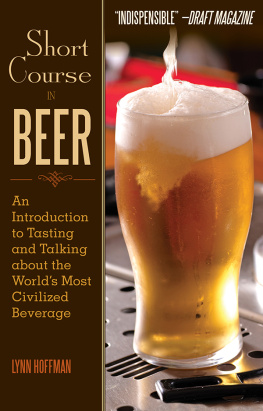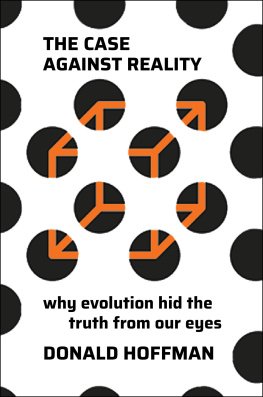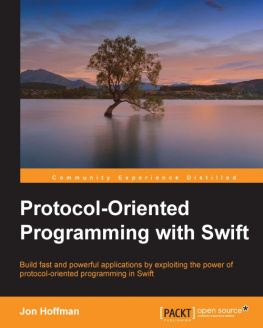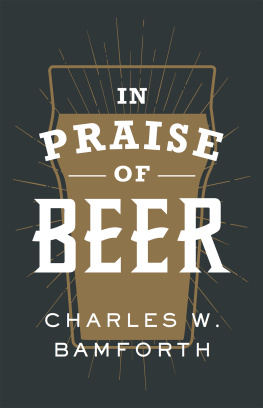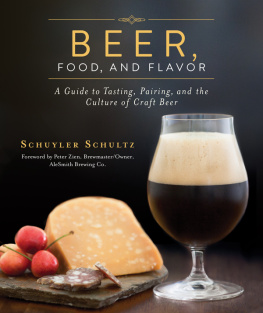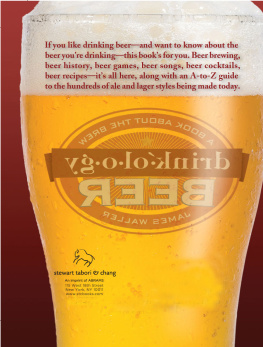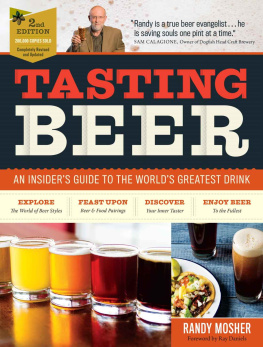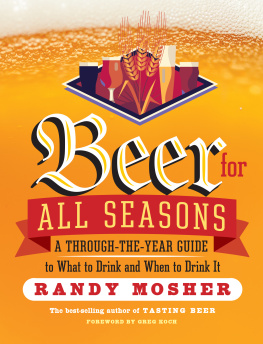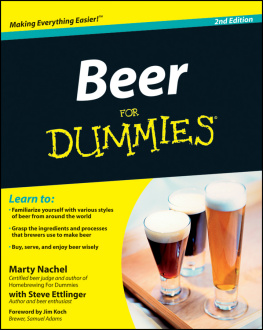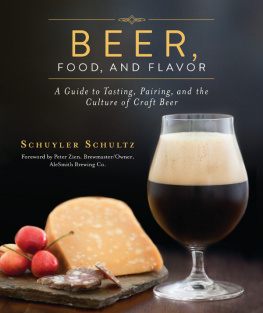Copyright 2009, 2012 by Lynn Hoffman
Final Thoughts and additional materials 2014 by Lynn Hoffman
The Short Course in Beer was originally published by Kunati Inc. in 2009
All Rights Reserved. No part of this book may be reproduced in any manner without the express written consent of the publisher, except in the case of brief excerpts in critical reviews or articles. All inquiries should be addressed to Skyhorse Publishing, 307 West 36th Street, 11th Floor, New York, NY 10018.
Skyhorse Publishing books may be purchased in bulk at special discounts for sales promotion, corporate gifts, fund-raising, or educational purposes. Special editions can also be created to specifications. For details, contact the Special Sales Department, Skyhorse Publishing, 307 West 36th Street, 11th Floor, New York, NY 10018 or .
Skyhorse and Skyhorse Publishing are registered trademarks of Skyhorse Publishing, Inc., a Delaware corporation.
www.skyhorsepublishing.com
10 9 8 7 6 5 4 3 2 1
Library of Congress Cataloging-in-Publication Data is available on file.
Cover design by Brian Peterson
Print ISBN: 978-1-62914-495-5
Ebook ISBN: 978-1-62087-517-9
Printed in China
Contents
Foreword
Why take a Short Course in Beer?
B ecause its time to learn what much of the world already knows: beer is complex, delightful and an interesting companion to good food. There are so many people who have discovered this lately that theres a community of beer-lovers developing thats devoted to, and knowledgeable about, good beer. Beer may have a bad reputation in some places and it may have even earned that reputation once upon a time. After all, how seriously can you take a drink associated with:
drunken kegger parties
lager-crazed soccer fans
freezing-cold, tasteless beer
moronic commercials
But things have changed. Some of the most creative minds in the world of taste are brewing delicious beer and others are cooking food to complement it. Historic craft-beer traditions are being revived and new ones are being created. Brewpubs are brewing their own beer and homebrew enthusiasts are following suit. There are craft-beer festivals and beer tasting parties. If youre a competitive type, there are even competitions and medals and bragging rights. Most of all, theres a lot of startlingly delicious, beautiful beer available for your pleasure. Its time to get in on the fun.
When you finish this book, you will:
know that beer is a truly complex and wonderful drink, worthy of your attention, and a companion for the finest food
be able to make sense of all those wonderful flavors
know how beer is brewed and where gets its flavor
understand the difference between the beers that are worth your time and digestion, and the ones that arent
have a few thoughts about the place of alcohol in life
appreciate the intimate relationship between beer and civilization
know how to find and enjoy a good brew and have a laugh at those who do not
Acknowledgments
Brewers:
Allagash, Yards, PBC, Russian River, Dogfish Head, Victory, Dupont, Flying Fish, and River Horse
Beer Heroes:
Tom Peters at Monks Cafe, Fritz Maytag, Randy Mosher, Michael Jackson, and the entire Belgian Nation
Tasting Partners:
Joan Adler, Phil Seitz, Peter Nyheim, the Mathes, the Rekamps, Laura Holbert, and Ryan Ritter
Passionate Brewers:
The Wissahickon Brewers Guild

CHAPTER 1
BEER
AND THE NATURE OF THE UNIVERSE
W hen you finish this chapter, you will have:
an understanding of the connection between beer-making and one of mankinds most important inventions
a sense of the relationship of beer and early concepts of the divine
a healthy dislike for experiments in prohibition
some ideas about beers future
the beginning of a sense of connoisseurship about that bubbly stuff with the head on it
Beer is, at its best, a philosophers drink:
It stimulates sensitive souls to ask questions without arousing the arrogance that might lead them to easy answers.
Although we seem to have forgotten it, beer is worth our attention because it can be delightful, but its also worth a moments thought because its been important in the daily lives of many people and cultures for centuries.
For instance: outside of the wine growing countries of the Mediterranean, most adults in Europe drank beer all day every day. Both water and milk were potentially dangerous. Beer and wine were both purified as they were made. So up until the seventeenth century, peoplemen, women, and childrendrank some alcoholic beveragewine, cider, or beer. They woke up with it and they went to bed with it. These drinks didnt contain as much alcohol as modern wines and beers, but everyonemom, dad, the kids, the priest, and the kingwere consuming alcohol all the time. Consider that life spans were short and that society was patriarchal. That meant that most of the worlds business was run by relatively young men who had a bit of a buzz on. In that light, does European history start to make a bit more sense? Does it help you understand bizarre events like the Crusades or the Hundred Years War? If the crew of folks who surrounded you at the pub last night had been in charge, would things have been any different?
Press the rewind button; more questions. When the first agriculturalists settled down to tend and harvest cereals, were they interested in baking bread or in brewing beer? Did the shift from home-brewing to industrial production of beer change the economic role of women in European society?
Or try this: Does the prevalence of cheap, industrial beer indicate a decline in taste in Western society? Does it point to the primacy of price in consumer decisionmaking?
Lets take a look at some of the ways that simple beer connects us to the big questions.
Bread, Grain, and the Staff of Life
Everyone who looks at human history is eventually impressed by the presence of certain milestone events. These are the inventions, occurrences, conceptions and arrangements that make human life forever different. Im not talking about the millions of ordinary changes that occur to humankind in the course of a year. Instead, Im referring to really fundamental changesthings that alter the way we relate to one another and the way we see ourselves and the universe.
Printers and their ilk, for instance, are impressed by Gutenbergs invention of moveable type and see it as world-changing. Similar claims are made for the integrated circuit, Marconis wireless, universal public education, and free libraries. Political scientists, historians, and journalists like to point to the events of 1776 and 1789 in Philadelphia. Engineers and economists like to cite the Industrial Revolution. Other scholars like the opposable thumb and forefinger or the discovery of the Pill.
From the perspective of daily life, the most fundamental, revolutionary change was the shift from food gathering to food production. For most of our history we were, like other animals, food-finders. We searched for something to eat and then picked it or killed it. At some point in our history, perhaps relying on observations of the natural life cycle of grain-bearing plants, some humans became food-cultivators or farmers. For years, pre-historians have insisted that the turn to farming was led by a desire for bread. It is just as likely that it was prompted by the love of beer.
The evidence suggests that the first food we cultivated was a graina grass-like plant that bore edible seeds. The seeds of grasses are wonderfully nutritious, even though they require some work to become palatable. Each seed contains a tiny proteinaceous plant embryo and the carbohydrates and fats necessary to sustain the embryo until it can produce its own food.

